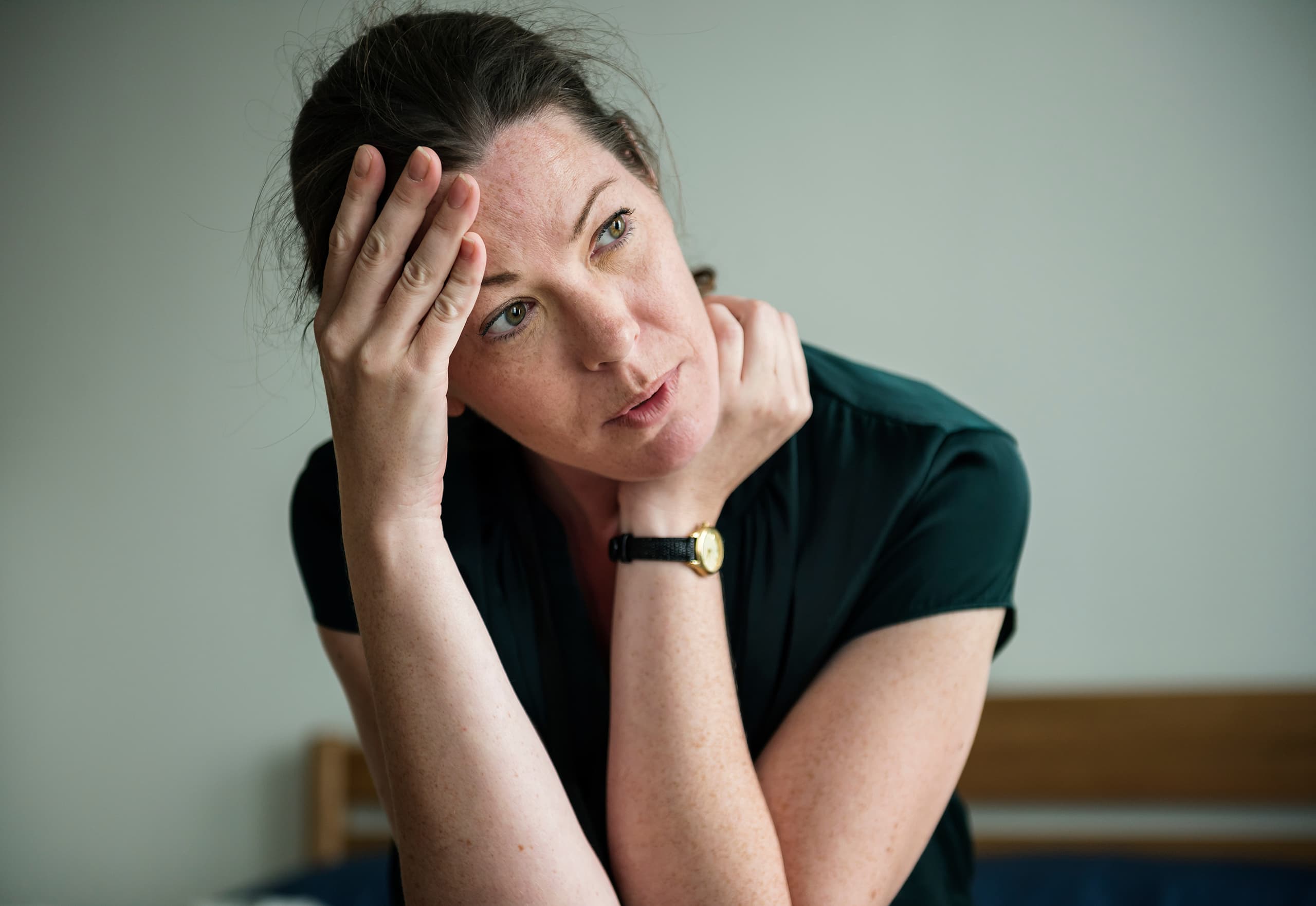Everyone will have feelings of anxiety at some point in their life. It’s perfectly normal and even beneficial for us to feel anxious at times but persistent anxiety can negatively impact many aspects of our daily lives.

If you think you need counselling support for anxiety or it has been recommended by your GP, please freephone The Spark in confidence on 0808 802 2088 during our opening hours. Or complete an enquiry form and we will call you back at a suitable time.
Anxiety – Frequently Asked Questions
In this section, you can find answers to common questions about anxiety and how counselling can support you to manage your anxiety.
What is anxiety?
Anxiety is a feeling of worry or fear that is not always related to a specific situation. It is a normal human emotion that everyone experiences at some point in their lives, but when it becomes excessive or chronic, it may be considered an anxiety disorder. Anxiety disorders are the most common mental health condition in the world and can affect people of all ages, gender and backgrounds.
Anxiety can include physical symptoms such as muscle tension, heart palpitations, and difficulty breathing, as well as psychological symptoms such as restlessness, irritability, and difficulty concentrating. Anxiety can also cause behavioural changes, such as avoiding certain situations or activities, or engaging in repetitive behaviours.
Find out more about anxiety on the NHS Inform website.
What causes anxiety?
One of the main causes of anxiety is the activation of the body’s “fight or flight” response, which is a natural response to perceived danger. This response, also known as the “acute stress response”, is triggered by the release of stress hormones such as adrenaline and cortisol. These hormones increase heart rate, blood pressure, and prepare the body for physical action. Additionally, it also causes a freeze response, which is when the body is faced with an overwhelming threat and the individual becomes paralyzed, unable to act. This response is a last resort, when fight or flight is not possible. Anxiety disorders occur when this response is activated too frequently or without an apparent reason.
How can counselling help with anxiety?
Counselling, also known as talking therapy, can be an effective treatment for anxiety. It involves talking to a trained counsellor in a confidential and supportive environment. The counsellor can help you understand and manage your anxiety symptoms and help you to identify and address the underlying causes of your anxiety.
Some of the ways counselling can help with anxiety include:
- Identifying and changing negative thought patterns: a therapist can help an individual to recognize and challenge negative thoughts and beliefs that are contributing to their anxiety.
- Learning relaxation techniques: counselling can teach individuals techniques such as deep breathing, progressive muscle relaxation, and mindfulness, which can help to reduce physical symptoms of anxiety.
- Developing coping skills: a therapist can help an individual to develop effective coping strategies for dealing with anxiety-provoking situations and triggers.
- Addressing the underlying issues: counselling can help to address and resolve underlying issues such as past traumatic experiences, relationship problems, or other stressors that may be contributing to the individual’s anxiety.
- Improving communication: counselling can also help to improve communication and social skills, which can be particularly beneficial for individuals with social anxiety disorder.
It’s important to note that counselling may not be the only treatment that is needed, medication may be prescribed by a doctor, and in some cases, a combination of medication and counselling can be the most effective treatment.
Can you get counselling free on the NHS?
Yes, you can be referred for counselling by your GP. However, waiting times can be lengthy and group sessions instead of one-to-one sessions are common. Organisations like The Spark offer affordable one-to-one counselling sessions.
What else can I do to help my anxiety?
There are several self-help techniques that can be used to manage anxiety symptoms. Here are a few examples:
- Relaxation techniques: Practicing relaxation techniques such as deep breathing, progressive muscle relaxation, and yoga can help to reduce physical symptoms of anxiety.
- Exercise: Regular physical activity can help to reduce anxiety by releasing endorphins, which are chemicals in the brain that improve mood.
- Mindfulness: Mindfulness techniques such as meditation, guided imagery, and journaling can help to focus the mind and reduce worries.
- Challenge negative thoughts: Identifying and challenging negative thoughts and beliefs that are contributing to your anxiety can be helpful. This can be done through techniques such as cognitive-behavioural therapy (CBT)
- Get enough sleep: Maintaining a consistent sleep schedule can help to reduce anxiety and improve overall health.
- Eat a healthy diet: Eating a healthy diet that is rich in nutrients can help to reduce anxiety symptoms.
- Connect with others: Talking to friends and loved ones about your anxiety can provide a supportive and understanding environment. Joining a support group or participating in online forums can also be helpful.
- Identify triggers and make a plan: Identifying and avoiding triggers that provoke your anxiety and having a plan in place to deal with these triggers, can be helpful.
Self-help techniques can be beneficial in managing anxiety symptoms, but they are not a substitute for professional help. If symptoms persist, it’s important to seek professional help.
Should you see your GP about your anxiety?
You may want to go see your GP if your feelings of anxiety are constant, affecting your daily life or causing you distress.
Some signs that it may be time to see a doctor include:
- Persistent and excessive worry or fear: if you find yourself worrying or feeling afraid more days than not, or if your worries are interfering with your ability to function in your daily life, it may be time to see a doctor.
- Physical symptoms: anxiety can cause physical symptoms such as a racing heart, sweating, trembling, and difficulty breathing. If you are experiencing these symptoms on a regular basis, it is important to see a doctor to rule out any underlying medical conditions.
- Avoiding certain situations: if you are avoiding certain situations or activities because of your anxiety, it may be time to seek help.
- Difficulty sleeping: anxiety can cause difficulty falling asleep or staying asleep, and if this is a persistent problem, it may be time to see a doctor.
- Difficulty concentrating: anxiety can make it difficult to focus or pay attention, and if this is impacting your work or school performance, it is important to seek help.
- Substance abuse or self-harm: if you find yourself turning to alcohol or drugs to cope with your anxiety or if you are engaging in self-harm behaviours, it is important to see a doctor as soon as possible.
It’s important to remember that everyone’s experience with anxiety is different, and what may be manageable for one person may be debilitating for another. If you are struggling to cope with anxiety, fear or panic and the things you’re trying yourself are not helping it is a good idea to see a doctor. They can help you to determine the appropriate course of treatment and can refer you to a mental health professional if needed.
How to book a counselling for individuals appointment
Counselling sessions can be booked via our appointments team.
To get started complete the counselling enquiry form below and a member of our appointments team will follow up with you to confirm your availability.
Alternatively, you can call us for free on 0808 802 2088 during our opening hours.
Related articles and resources
Anxiety: 5 ways to cope better
Anxiety can be debilitating but it can be managed, this article looks at 5 practical ways to cope with anxiety.
Bad news, anxiety and the media
Escaping bad news and tragedy feels like an impossible task.
Anxiety: 6 self-care tips from a psychotherapist
Six more self-care tips to help tackle anxiety.
Enquire about counselling today
Whether you’re ready to book an appointment or you just want some more information about counselling use the form below to get in touch.

